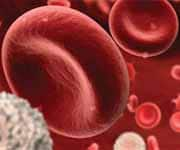|
|
Meta-analysis adds evidence to anti-inflammatory effect for vitamin E supplementation |
|
|
|
Tuesday, February 24, 2015. Results of a meta-analysis published on February 11, 2015 in the European Journal of Clinical Nutrition reaffirm an association between a reduction in
inflammation and supplementation with vitamin E.
K. Djafarian of Tehran University of Medical Sciences and colleagues selected 12 randomized, controlled trials including a total of 495 participants for
their analysis. Trials were limited to those that involved supplementation with 100 international units (IU) per day or more alpha or gamma tocopherol,
while reporting serum or plasma levels of C-reactive protein (CRP, a marker of inflammation) before and after treatment.
Pooled analysis of the data uncovered an average reduction of 0.62 milligrams per liter (mg/L) in CRP among subjects that received a vitamin E supplement. CRP levels decreased more among vitamin E-supplemented subjects whose levels were less than 3 mg/L at the beginning of the study in comparison with those whose levels were higher; however, the decline in both of these groups was significant. The decrease in CRP was greater when supplementation occurred for at
least six weeks in comparison with less than six weeks.
The authors suggest activation of AP-1 (activation protein 1), suppression of the ability of pro-inflammatory cytokines to induce liver synthesis of CRP,
and other potential mechanisms for vitamin E's anti-inflammatory effect. In contrast with other studies, the current analysis indicates that both alpha and
gamma tocopherol supplementation may help lower serum CRP.
"It seems that vitamin E supplementation may be a good strategy for decreasing inflammatory conditions in susceptible people, although large well-designed
randomized controlled trials are needed to confirm these results," the authors conclude.
|
|
|
| |
 |
|
What's Hot |
|
|
|
Higher dietary antioxidant capacity associated with lower cardiovascular disease indicators |
|
|
|
 |
|
| |
In an article published online on January 4, 2013 in the European Journal of Clinical Nutrition, researchers from the University of Connecticut report an association between improved dietary antioxidant capacity and reductions in plasma homocysteine and C-reactive protein (CRP), both of which are markers of increased cardiovascular disease risk.
The study included 4,391 men and women who participated in the National Health and Nutrition Examination Survey (NHANES) 2001-2002. Questionnaire responses concerning diet and supplement use over a 24 hour period were analyzed to provide the antioxidant capacities of 43 nutrients. (The antioxidant capacity of 30 flavonoids was determined from food sources only.) Blood samples were analyzed for serum levels of alpha and gamma tocopherols, six carotenoids and CRP, and plasma total homocysteine.
Total antioxidant capacity (TAC) was correlated with serum vitamin E and carotenoid levels. As TAC rose, the risk of having a total homocysteine level of greater than 13 micromoles per liter decreased. Those whose intake of antioxidants was among the top 25 percent of participants had more than double the chance of having a homocysteine level under 13 micromoles per liter in comparison with those whose TAC was among the lowest fourth. A reduction in the risk of having a CRP level of 3 milligrams per liter or higher was also observed in association with increasing TAC. A significant decline in homocysteine and CRP was observed in association with higher TAC from diet combined with supplements or supplements alone, but not with diet alone.
"Dietary TAC was associated with improved serum antioxidant status and decreased risk factors of cardiovascular disease including serum CRP and plasma total homocysteine concentrations," the authors conclude. "The implicated applicability of dietary TAC needs further validation in prospective cohort studies."
|
|
|
| |
 |
|
Life Extension Clinical Research Update |
|
|
|
Participate in a Clinical Study:
Support blood sugar and blood vessel health (CL049)
South Florida Location
Study objective:
Assess the effectiveness of nutritional supplements to improve blood sugar and blood vessel health over the course of 90 days.
To Qualify:
- You must be between 25 and 65 years of age.
- Have mildly elevated blood sugar with no previous diagnosis of diabetes.
- Be overweight (BMI of 25 - 34.9).
Your Involvement:
- You will make 5 visits over 90 days.
- You will receive the nutritional supplement to be studied, blood tests, and blood vessel health evaluations.
- Upon successful completion of the trial you will be compensated for time and travel up to $250 plus a $100 Life Extension® gift card.
Or call 1-866-517-4536
Referral Bonus Available: $100*
Life Extension Clinical Research, Inc. engages in cutting-edge clinical trials with the goal of extending the healthy human life span and defeating disease. Our clinical research is designed to explore the potential of innovative dietary supplements, pharmaceuticals, topicals (cosmetic), and medical devices.
*If you refer someone who enrolls in a study and completes their final visit with closeout procedures, you will be compensated the amount noted for the study. |
|
|
|
 |
|
Health Concern
Chronic inflammation |
|
|
Of the ten leading causes of mortality in the United States, chronic, low-level inflammation contributes to the pathogenesis of at least seven. These include heart disease, cancer, chronic lower respiratory disease, stroke, Alzheimer's disease, diabetes, and nephritis (Centers for Disease Control and Prevention 2011; Bastard et al. 2006; Cao 2011, Jha et al. 2009; Ferrucci et al. 2010; Glorieux et al. 2009; Kundu et al. 2008; Murphy 2012; Singh et al. 2011).
C-reactive protein (CRP) is an acute-phase protein, one of several proteins rapidly produced by the liver during an inflammatory response. Its primary goal in acute inflammation is to coat damaged cells to make them easier to recognize by other immune cells (Meyer 2010). CRP elevation above basal levels is not diagnostic on its own, as it can raise in several cancers, rheumatologic, gastrointestinal, and cardiovascular conditions, and infections (Windgassen et al. 2011). Elevation of CRP (as determined by a high-sensitivity CRP assay or hs-CRP) has a strong association with elevated risk of cardiovascular disease and stroke (Emerging Risk Factors Collaboration et al. 2010).
Vitamin E functions as an antioxidant in the body. Specifically, vitamin E is incorporated into low-density lipoprotein (LDL) particles and protects them against oxidative damage; it seems to guard against atherosclerosis via other mechanisms as well (Meydani 2001). The gamma-tocopherol form of vitamin E appears to complement the anti-inflammatory action of alpha-tocopherol. Gamma-tocopherol has been shown to inhibit COX-2 and attenuate IL-1β signaling (Jiang 2000; Sjoholm 2001). In a small clinical trial on subjects with metabolic syndrome, the combination of gamma-tocopherol and alpha-tocopherol effectively suppressed C-reactive protein and TNA-α levels compared to placebo (Devaraj 2008). In this study, the combination of both tocopherols performed better than either alone, prompting the investigators to remark "the combination of [alpha-tocopherol] and [gamma-tocopherol] supplementation appears to be superior to either supplementation alone on biomarkers of oxidative stress and inflammation and needs to be tested in prospective clinical trials..."
|
|
|
| |
 |
|
Latest Products |
|
|
|
 |
Super Omega with Krill & Astaxanthin, 120 softgels
Item #01819
|
|
|
|
Scientists suggest that combining fish oil and krill oil may provide enhanced support for cardiovascular health and the brain due to the different ways that fish oil and krill oil are taken up by our cells. Fish oil and krill oil share many important similarities, such as reducing levels of omega-6 relative to beneficial omega-3 fatty acids. Most Americans consume too many omega-6 polyunsaturated fatty acids and not enough omega-3s.
Evidence suggests that by combining both fish and krill oil, you can maximize uptake and the protective benefits of a wide spectrum of omega-3 fatty acids. To provide enhanced coverage, a new Super Omega contains a potent concentration of fish oil, olive fruit, and sesame lignans, plus krill and astaxanthin.
Human studies suggest that omega-3 fatty acids from fish oil result in a more rapid uptake into plasma triglyceride and platelet phospholipids, which specifically benefit the cardiovascular system.
The omega-3s found in krill appear to be more rapidly incorporated into red blood cell phospholipids, which are rapidly absorbed into brain cells. |
|
|
|
 |
Natural Estrogen, 60 vegetarian tablets
Item #01892
|
|
|
|
Natural Estrogen combines a patented hops extract with standardized lignans and other compounds that have been shown to target menopause symptoms. The compounds in Natural Estrogen include:
- Hops extract: Clinically shown to reduce frequency of hot flashes by 50% and improve various other menopausal discomforts.
- Lignan extract: Clinically shown to block some of estrogen's unwanted effects.
- Licorice extract: Clinically shown to reduce the severity and frequency of hot flashes.
- Broccoli extract: Found to modulate estrogens and maintain healthy cell division.
- Dong Quai: Believed in Chinese medicine to help with menstruation and menopausal symptoms.
- Chasteberry extract (Vitex agnus-castus): Shown to support hormone and neurotransmitter balance, which is important for relief of menopausal symptoms
|
|
|
| |
 |
|
Related Life Extension Magazine® Articles |
|
|
|
|
|
|







